Total Recall: the only Copilot+ AI feature that matters is a huge privacy risk
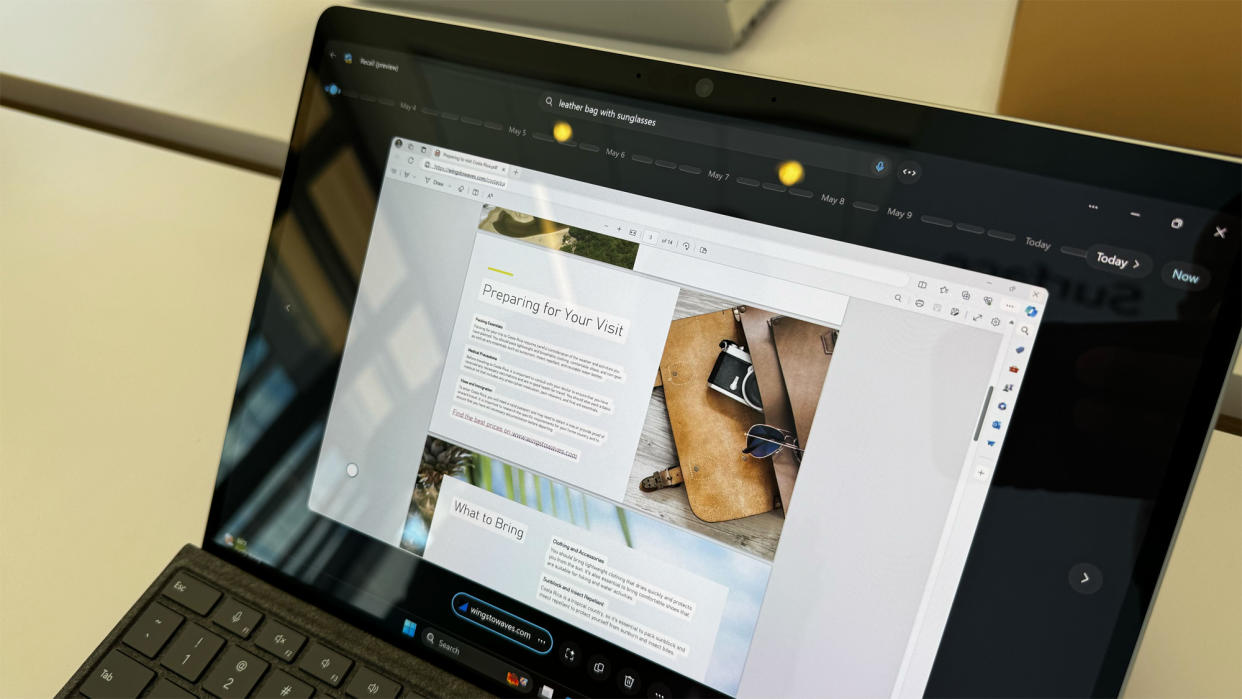
Microsoft's just-announced classification of "Copilot+ PCs" leaves a lot of users out in the cold. To access a suite of new AI features in an upcoming build of Windows 11, you'll need a processor with a Neural Processing Unit (NPU) that capable of hitting 40 TOPS (Trillion Operations Per Second). To date, there's only one processor family that can hit that number: Qualcomm's upcoming Snapdragon X series of mobile chips. And the first laptops with Snapdragon X aren't even due to ship for a few weeks.
Anyone who currently owns a laptop or desktop — even if it has one of the best CPUs — is out of luck and won't have access to these features. Laptops based on Intel's next-gen Lunar Lake CPUs will ship in Q3 and will meet the 40+ TOPS requirement, but any computer you currently own, or buy today, will not.
So, how bad should you feel about being left out in the cold? If Microsoft's Copilot+ PC press event this week is any indication, not very bad at all. Of the four exclusive AI features Microsoft showed, three are either available elsewhere or are so niche that few people will use them. Only one, Recall, offers something PC users haven't seen before — and it has some very creepy implications for your privacy.
Before we talk about Recall, why it's useful, and why it might also be a security nightmare, let's spend a moment on why you shouldn't care about the other Copilot+ features. They are:
Cocreator: This is a text-to-image generator that will be available as a button in the Paint app. There are plenty of other text-to-image generators already on the market, including local versions of Stable Diffusion. And there are a slew of free, cloud-based image generators, such as Copilot Designer (accessed from built-in Windows Copilot), Google Gemini, and Meta AI.
Windows Studio Effects: Available in Quick Settings, this tool adds filters to your webcam outputs. It adjusts the lighting, allows you to play with the color, and makes it look like you are staring straight at the camera, even if you are not. But there are numerous other applications that offer webcam filtering of different kinds. Nvidia Broadcast will do this for anyone with an RTX card. XSplit Vcam is another option. And many conferencing services such as Zoom and Google Meet have built-in filters that use the cloud.
Live Captions with Real-Time Translation: Windows 11 already has a Live Captions feature, available in the Accessibility section. So, if you just want to have captions for everything that comes out of your speakers, you already have that. The real-time translation feature is new for Windows, but major online conferencing services such as Microsoft Teams and Google Meet already have it built in. YouTube also has auto captions and translating. How often are you going to need a translation in real-time and not be using one of these services?
Recall, on the other hand, offers a feature that you can't get in Windows right now. When enabled, it takes a screenshot, called a "snap," every few seconds — of your entire desktop. You can then open Recall and query the content of your images or scroll through your timeline to remind you of what you were doing.
So, for example, if you were doing some online shopping a few days ago, you can search Recall for "red shoes" and it will show you all the snapshots of the moments where you were looking at red shoes. If you were on a website, you'll also get a link under the snapshot, that you can click to go back to the page you were on. If the result was in a Word document or a PowerPoint presentation, Recall will open the appropriate file for you and even take you straight to the slide (in the case of PowerPoint) with the data on it.
If you ask about a presentation or a spreadsheet you were working on, Recall will take you back to the snapshot you were working on and you can even copy text directly from the snapshots (essentially, image-to-text). Since it has screenshots of all your online conversations, you can also ask it "what did grandma say" and it will show you screenshots of your conversations with her.
Senior Editor Brandon Hill got a chance to see Recall in action at Microsoft's press event. He saw someone search for "papaya salad" and get a snapshot of a web page in the timeline from when the user had visited a recipe website. He saw someone query "can you find my water report" and Recall showed a mix of web pages, a PDF, and an Excel document that all had water reports on them.
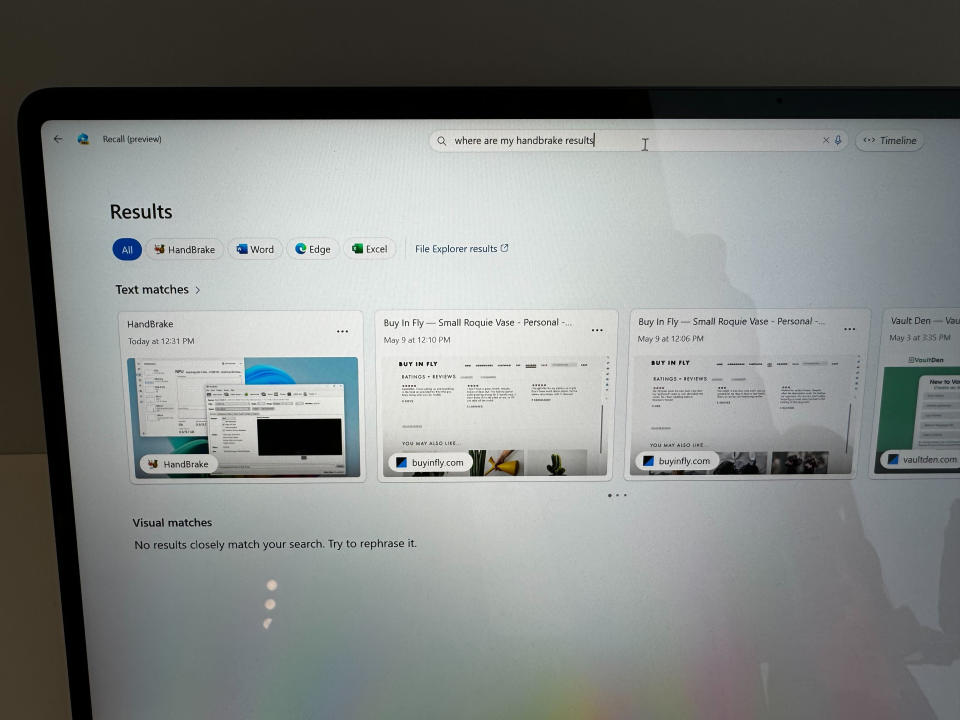
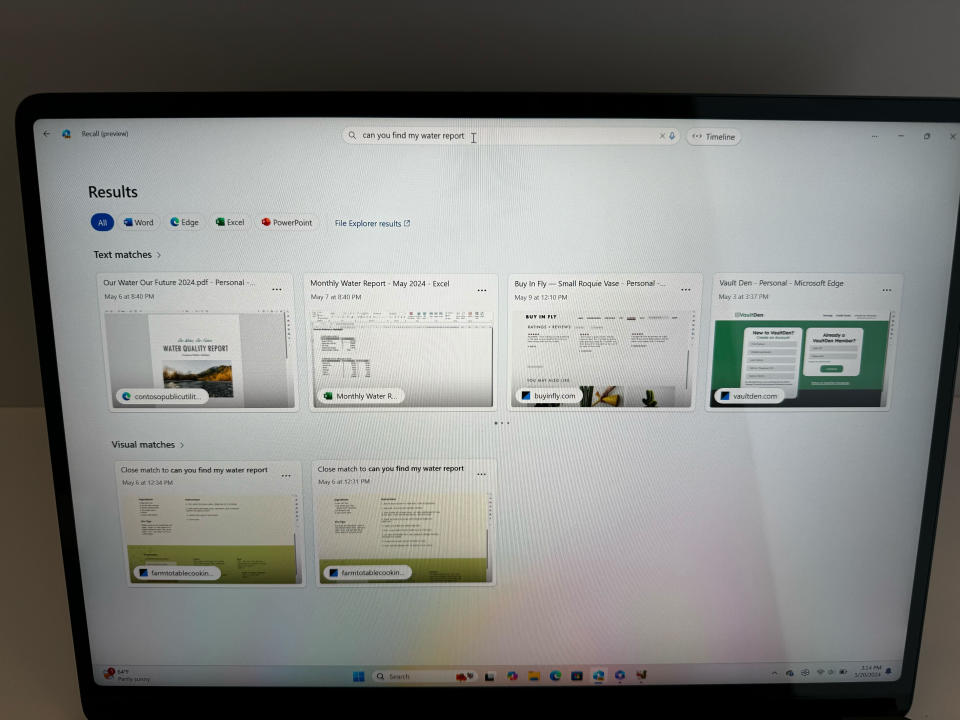
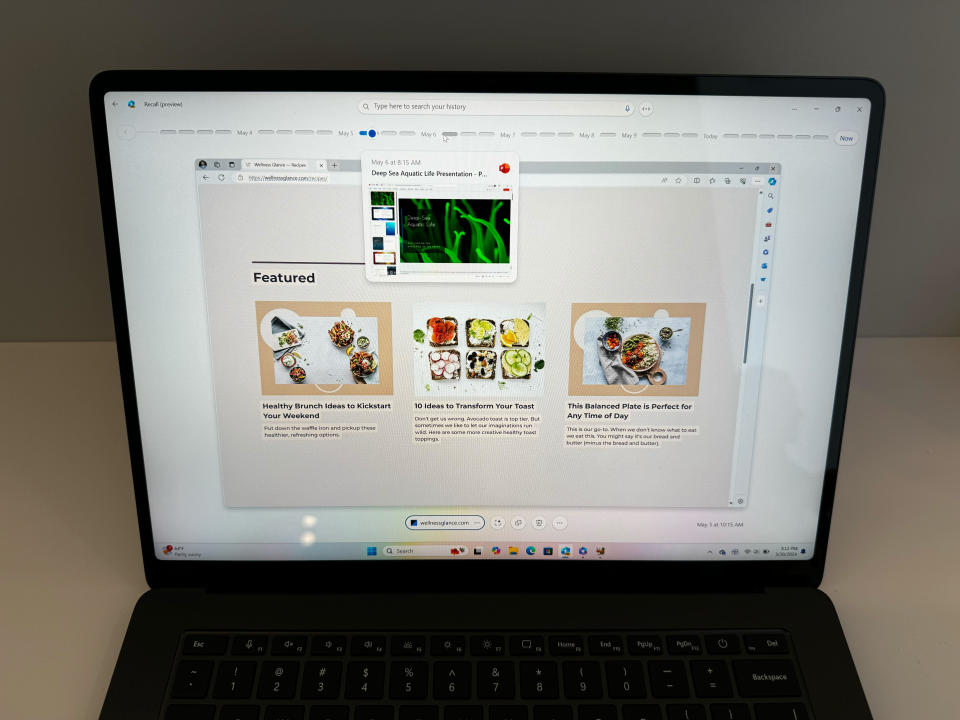
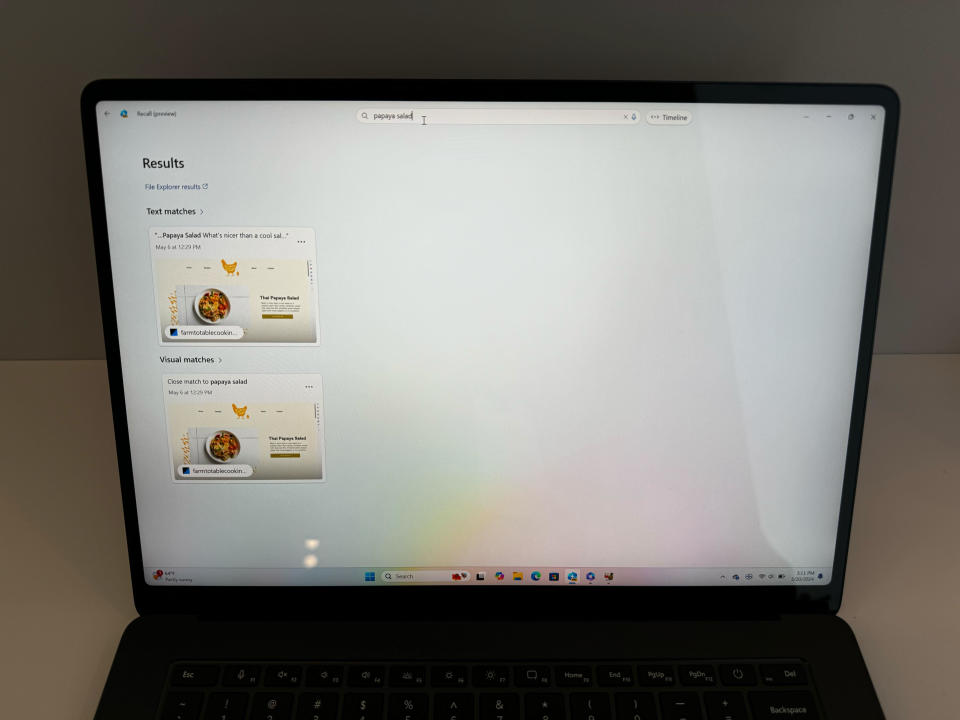
He also shot the video below. In it, you can see a Microsoft rep scroll through Recall's timeline and then ask it for "offer" which pulls up images of offers.
Google Photos and other online services have a lot of the same image-recognition capabilities as Recall. I went through my Google Photos album and asked for a variety of things, the online tool did a great job of locating photos I had never tagged. When I asked it for "Halloween," it accurately pulled up pictures of me and my kids in costume. And when I asked it for "Maya," it pulled up pictures of my daughter from her birthday because she was wearing a crown with her name on it and it read the text.
Recall combines the ability to index photos based on content with an archive of constant screenshots of your activity. And it adds in image-to-text and image-to-web-page-URL capabilities. It's just speculation on my part, but perhaps a future version of the tool will integrate with other parts of your OS; I could imagine it adding something to your calendar if you tell a friend in a chat message, "I'll meet you at 7:30."
For Mac and iOS users, there's a third-party app called Rewind that does what Recall does — and it also includes audio recognition. But we've never seen anything like Recall for PCs until now.
The question is this: How comfortable do you feel about having an app that tracks your every activity, keeping an image record of it? And do you really want (or need) a tool to ask about... your own activities?
Microsoft is taking some steps to make sure that the snaps Recall takes stay private. According to the company, the snaps remain encrypted on your local storage drive and are never synced to the cloud or sent to Microsoft. You also have the ability to exclude apps from Recall, delete individual snaps, or disable the feature entirely. It's easy to see why Recall would need a powerful NPU to search through all of those images without getting any help from a server on the Internet.
But let's be clear: Recall poses some serious privacy risks even if it works as advertised. You're creating photographic records of all your activities — including every time you type in a password that isn't hidden by **** symbols. This also applies also to sensitive personal data, such as your social security number or bank account number. If someone found a way to log into your computer — either in-person or remotely — they could easily find this treasure trove of important information. And if you share a family computer with the kids or a spouse and they don't log in under their own accounts (which they should) they can also see your snaps.
Whether you feel comfortable with the privacy risks of Recall, you have to ask: Is Recall a game-changing feature that would make you buy a new PC — or, conversely, not buy a PC that doesn't support it? My guess is that, for most people, the answer is "no."
If the answer is "yes," you'll need to either buy one of the handful of Snapdragon X-powered laptops coming out in June or wait until the fall, when Intel (and possibly AMD) will have mobile chips with similarly-powerful NPUs. If you want a desktop PC of any kind, get ready to wait — we don't expect desktop chips with NPUs until at least Q4, when Intel Arrow Lake processors come out.

